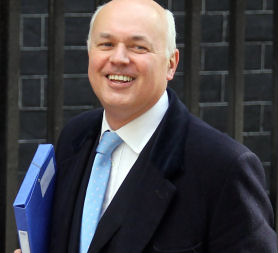Duncan Smith: universal benefit deal could cut £9bn
Millions of people who claim welfare benefits could see them scrapped – and replaced with one “universal credit” under a deal agreed with the Treasury.

The Work and Pensions Secretary Iain Duncan Smith has managed to secure a deal getting rid of dozens of payments, including housing benefit, income support, and incapacity benefit, according to The Times.
Mr Duncan Smith, who’s been fighting a lengthy battle with the Treasury over whether the plans are affordable, claims it will mean long term savings in the welfare bill, of up to £9 billion a year. And crucially, he’s being allowed to use much of the first year’s savings to fund the changes, overcoming Chancellor George Osborne’s objections over the cost of implementing such a radical overhaul.
Under the new rules, anyone taking a job will be told they are guaranteed to be better off than if they remained on the dole. And anyone still claiming will be allowed to keep more of their benefits when they get a job or increase their working hours – possibly as much as 65p for every pound they earn, says the Times.
At the moment more than a hundred thousand people lose 90 percent of their benefits for every pound earned – with more than one and a half million people losing 70p – which, says Mr Duncan Smith, traps too many people into staying on welfare.
A spokesman for the DWP said it had agreed with the Treasury on “the urgent need to reform the welfare system and help more people into work and off benefits.” And the Department claims that the new system will reduce fraud, because everyone’s details will be held on a single system.
The full details will be announced at next week’s Conservative party conference – although the future of child benefit has not yet been decided. Officials are said to be discussing the possibility of means testing, taxation, or getting rid of it altogether.
The Institute for Fiscal Studies said it needed far more information on how the universal credit would work in order to have an informed debate – but said it could be “one of the most important changes brought about by this Government”.
It’s all part of the most sweeping public spending cuts for a generation – as each Whitehall department gets ready to set out details of its share of the £83 billion worth of cuts in the spending review later this month.